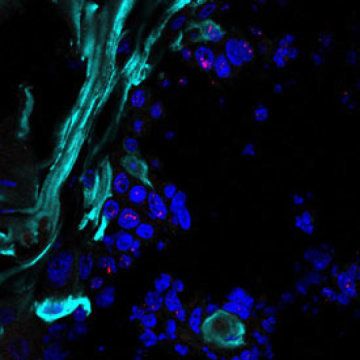A team of researchers led by professor Jean-Christophe Marine (VIB-KU Leuven) has identified NEAT1, a non-coding RNA, as a potential therapeutic target in the fight against cancer. In collaboration with the Cédric Blanpain lab (ULB), VIB researchers have shown that NEAT1 plays an important role in the survival of highly dividing cells — and in particular of cancer cells. These findings can help develop new drugs that target NEAT1, in order to kill cancer cells more effectively.
As a non-coding RNA, NEAT1 is not translated into a protein. It does however contribute to the formation of so-called ‘paraspeckles’, subnuclear particles that can be found in the cell nuclei of cancer cells. The function of these particles has remained obscure. Although highly conserved through evolution, NEAT1 appears to be dispensable for normal embryonic development and adult life as mice lacking NEAT1 are viable and healthy.
Guarding the genome
PhD student Carmen Adriaens (VIB-KU Leuven): “In our study, we have found that the expression of NEAT1 in the cell nucleus is regulated by p53. This protein plays an important role in protecting people against cancer and is known as ‘the guardian of the genome’. When a cell is stressed or damaged, p53 will upregulate the expression of NEAT1, which leads to the formation of paraspeckles. This has two possible outcomes: the cell can either go into transient cell cycle arrest, giving it time to deal with the stress and repair the damage before continuing cell division. If the stress or damage is too high, however, p53 will instruct the cell to commit suicide and die.”
